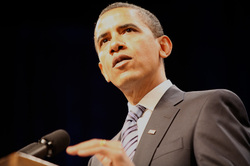
That sentence says the federal government has the power to grant financial aid to people who attend higher education programs
| | that “lead to gainful employment in a recognized occupation.” The important term there is “gainful employment.” The administration wants to define what that means in terms of the percentage of graduates that achieve it, and then punish the for-profit programs that don’t meet this standard. As this story on Politico.com explains it, the new rules “would flag programs as weak if their graduates’ average loan payments ate up 8 percent or more of their total earnings or 20 percent or more of their discretionary earnings. They would also be flagged if the default rate for former students exceeded 30 percent. “Any program that failed those tests two out of three consecutive years would face a crippling penalty: The Education Department would refuse to extend financial aid to its students. That would choke off the colleges’ primary source of revenue — and effectively force them to close the targeted programs.” The problem with this isn’t the idea of getting tough on colleges and programs that are ripping people off by promising careers they can’t deliver. The problem is one of process, as well as fair application. After all, how many public universities and programs don’t deliver on their promises? To be fair, the administration is working on a system to rate public and private non-profit universities, and that rating will include employment and salary figures for graduates. But it doesn’t appear this system will come with any consequences for the poorly performing schools, other than some bad publicity. In a letter to Education Secretary Arne Duncan, Steve Gunderson, the president and CEO of the Association of Private Sector Colleges and Universities, said: “Since the beginning of the negotiated rulemaking process, we have expressed our concerns about the Department’s regulatory approach. We cited the make-up of the negotiating committee; the Department’s improper use of the statutory language requiring institutions to offer programs that prepare students for ‘gainful employment’ as a means to regulate student debt; and the Department’s focus on private sector institutions, which irrationally and unlawfully favors traditional public and nonprofit institutions, many of which have programs that would likely lose Title IV eligibility were they subject to the same regulatory scheme.” He also said, “It is not clear, for example, that graduates of more traditional colleges have substantially better debt-to-earnings ratios than graduates of private sector institutions.” Gunderson said the for-profit programs tend to enroll older students, of which 40 percent maintain jobs while attending classes. Half are parents. About two-thirds have incomes low enough to qualify for Pell Grants. If the administration ends up shutting down several private programs, community colleges won’t have the capacity to accept them. Politico notes the administration counters that students in for-profit programs make up 13 percent of all higher education enrollees and yet are responsible for about half of all student loan defaults. In addition, there are plenty of stories circulating about students being ripped off by broken promises. Again, what about the public and private non-profit schools that charge enormously high tuition and produce students who either drop out or end up unemployed or with low-paying careers? Again, this is a process that affects a wide swath of the American public, and it therefore deserves the attention of the people’s representatives in Congress. Politico quotes North Carolina Rep. Virginia Foxx as saying, “We all agree that substandard schools, whether public, private or for-profit, should face consequences if they fail to provide the education and opportunities they promise, but we are in the middle of re-authorizing the Higher Education Act, and this is a perfect opportunity for the president to work with Congress to find a solution on this complex issue.” Fairness and a system that results from the considered deliberation of the people’s representatives — that can be a messy process, but it’s what this nation is all about. |

 RSS Feed
RSS Feed

